Take a photo of a barcode or cover
207 reviews for:
The Half Has Never Been Told: Slavery and the Making of American Capitalism
Edward E. Baptist
207 reviews for:
The Half Has Never Been Told: Slavery and the Making of American Capitalism
Edward E. Baptist
Really excellent book about American slavery and the economy and how the American economy was built on slavery. Incredibly detailed, very readable. Really puts into stark relief how bad my memory for names is. I really liked the organizational system and how the book moved through time. Highly recommend.
informative
slow-paced
A favorite of 2014 recommended by Thomas and Lindsay.
Check our catalog: http://encore.cooklib.org/iii/encore/search/C__Shalf%20has%20never%20been%20told%20baptist__Orightresult__U;jsessionid=3AB3D8BB9EF136ECED7EAAA70CD038AE?lang=eng
Check our catalog: http://encore.cooklib.org/iii/encore/search/C__Shalf%20has%20never%20been%20told%20baptist__Orightresult__U;jsessionid=3AB3D8BB9EF136ECED7EAAA70CD038AE?lang=eng
challenging
dark
emotional
hopeful
informative
inspiring
reflective
sad
tense
slow-paced
dark
emotional
informative
reflective
slow-paced
Whenever I feel like I have a good grasp on how horrific and moral bankrupt slavery in the new world was, I read or learn something knew that just lets me know that I will never understand the depths of the horror that this was. Baptist argues really well that slavery is the main driving factor that turned America into a global superpower, and that the slave-owners in the south would stoop to new lows constantly to turn out higher profits and higher yields at the expense of the enslaved. I think this makes a really good argument that the Civil War to end slavery in the United States was not only good for ending slavery, but it was necessary, because there is no way that these slave capitalists would have ever stopped owning people on moral grounds or because they would suddenly find free labor as more efficient. I loved emphasizing that America's capitalist growth came from a base of torture, and I really appreciated that he would connect things like forced migration trails moving enslaved people south to modern day highways, roads, and other locations.
I think the only thing I didn't care for were the multiple asides that were spent defending Abraham Lincoln. I don't think he needed as much defense as Baptist gives to him (I am also aware this book is over a decade old and there has been a significant shift in how people approach Lincoln's legacy). There was also a little bit in the epilogue where Baptist connects slavery practices to modern day capitalism in America, and I think it would be an interesting expansion on his thesis, though that may be enough information for a whole other book and this one was already pretty hefty.
I think the only thing I didn't care for were the multiple asides that were spent defending Abraham Lincoln. I don't think he needed as much defense as Baptist gives to him (I am also aware this book is over a decade old and there has been a significant shift in how people approach Lincoln's legacy). There was also a little bit in the epilogue where Baptist connects slavery practices to modern day capitalism in America, and I think it would be an interesting expansion on his thesis, though that may be enough information for a whole other book and this one was already pretty hefty.
Graphic: Death, Emotional abuse, Genocide, Pedophilia, Physical abuse, Racial slurs, Racism, Rape, Sexual assault, Sexual violence, Slavery, Torture, Violence, Blood, Police brutality, Trafficking, Kidnapping, Grief, Murder, Sexual harassment
challenging
dark
emotional
informative
reflective
sad
slow-paced
challenging
dark
informative
reflective
medium-paced
Author Baptist magnificently writes a thorough history of the political economy of slavery and the means by which labor extracted from the enslaved created the wealth of the Western economy. Baptist's choice in language was highly effective, as well as his use of the imagery of the body as a means to narrate and analyze the history African American enslavement. Do you think of plantations when you think of the American South? Try using slave labor camp rather than plantation for a more accurate phrase. Rather than refer to people as 'slaves' Baptist uses 'the enslaved' to more accurately describe their life and humanity. Oh, and did you know the enslaved could be mortgaged, those mortgages bundled, then sold oversees to speculators in the same fashion as the shenanigans that caused the housing bubble to burst in the 2000s? I didn't either, until I read this fascinating work. Highly recommended.
informative
medium-paced
A great informative book. It provides things you probably knew and things you didn't have a clue about American slavery and how it built the world economy.
challenging
informative
reflective
slow-paced







